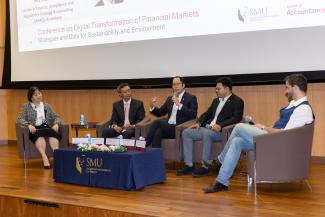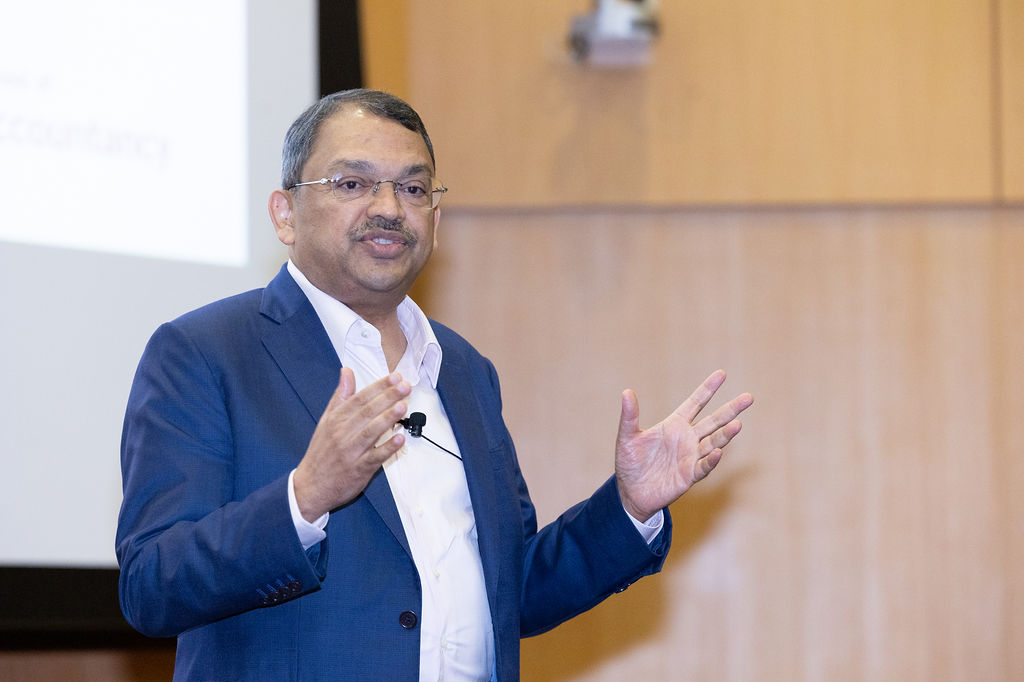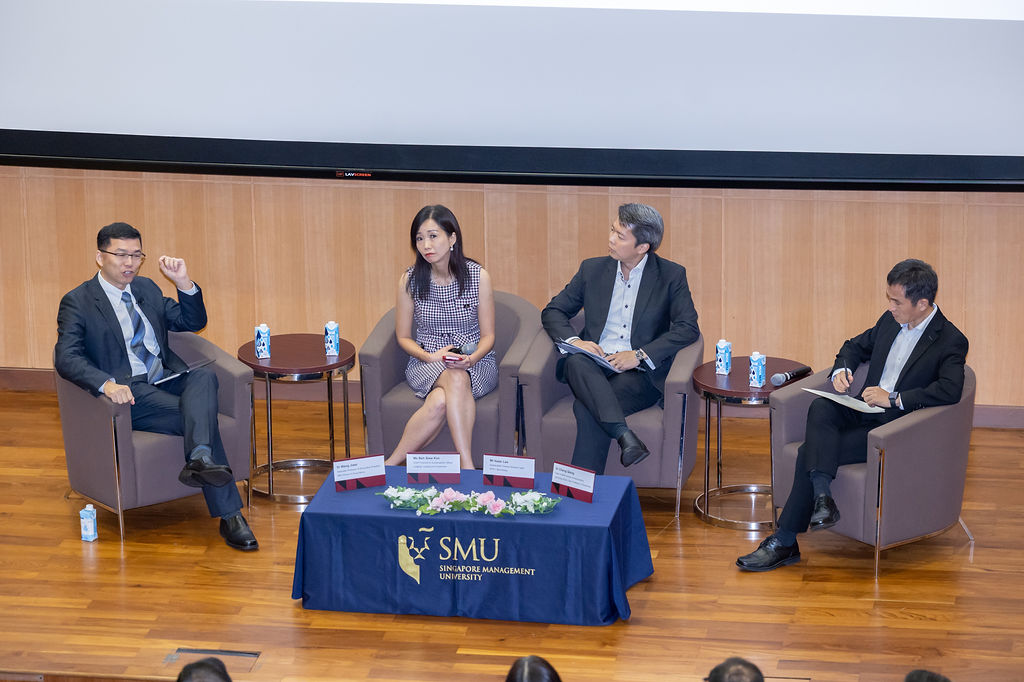
On Friday, 7 October 2022, the Singapore Management University’s (SMU) School of Accountancy (SOA) hosted the Conference on Digital Transformation of Financial Markets 2022. This was the second time that the conference was held, with the inaugural conference being well-received in 2021.
Embodying SMU’s strategic priorities
The focus of this iteration of the conference was “Strategies and Data for Sustainability and Environment,” with most of the discussion centred around environmental, social, and governance (ESG) reporting and practices.
In his opening remarks at the conference, Professor Timothy Clark, SMU Provost, expressed his delight to see that this year’s conference was a wonderful illustration of SMU’s strategic priorities of Digital Transformation, Sustainable Living, and Growth in Asia. He said,
“The speakers today will discuss issues on sustainability challenges, opportunities in Singapore and the region, as well as challenges and solutions to ESG data collection, data analytics, and reporting.”
Professor Clark went on to briefly touch on SMU’s own four pillars for sustainability — the cultivation of a greener university, the development of change agents through education, driving impactful research, as well as fostering resilient communities.
“Collective efforts across these strategies contribute to 13 of the United Nation’s (UN) sustainable development goals”, he shared, before going over the progress that the University has made using these pillars to guide its strategic direction.
Building sustainability around purpose
In his keynote address, Mr Sunny Verghese, Co-founder and Group CEO of Olam Group Limited, covered his views and learnings in Olam’s pursuit of sustainability from the perspective of a food and agriculture focused business.
Kicking off his address by sharing about the group’s re-organisation in order to deliver sharper focus and value, Mr Verghese highlighted the distinct operating groups within Olam, with each clearly having sustainability as a key component in its purpose.
For example, ofi (Olam Food Ingredients), intends to meet the growing demand for plant-based natural food ingredients, raw materials, solutions and services, with food sustainability at the heart of its offering. Olam Agri, whilst being a more traditional food and agriculture business, also works to cope with the impact of climate change, declining bio-diversity, and rising social inequities.
“In order to be sustainable and have a strategy that works, it has to be embedded in your purpose,” Mr Verghese clearly stated in his address. “Purpose is not your company’s vision or mission, nor is it about how you describe your business. It is about the reason why you do what you do. It is the animating force of the company.”
In sharing some of Olam’s sustainability goals, Mr Verghese also raised salient points that other businesses might be able to take away from. One of the goals shared was for Olam Group to move towards being a climate positive company, managing and reducing the group’s carbon footprints across different entities in the supply chain. To do so, Mr Verghese stated the importance of identifying drivers with high carbon intensity, and working on specific programmes targeting these hotspots.
Summarising his advice in sustainability, Mr Verghese said, “Be clear on what the purpose is. Be clear on what are the impacts you want, and be very specific and granular on targets. We (Olam) have 18 targets that we want to achieve by 2025, and 2030, and they’re broken down into yearly targets, and we publish our progress on these targets very transparently, both the good things that have happened and the bad things that have happened.”
Partnerships needed to move the needle of ESG in Singapore
The emphasis for the first fireside chat of the conference was on public-private partnership in ESG actions, and what is needed in this area to move the needle of ESG in Singapore.
Ms Irene Liu, Leader in Finance, Compliance and Regulatory Strategy & Consulting (APAC) in Accenture, was the moderator for the session, and opened the session by inviting the panellists to share their vision for a sustainable 2030 Singapore. A common point raised by each of the panellists was the fact that each and every individual has a part to play, and that it was important to recognise your place in the ecosystem.
Dr Simon Schillebeeckx, Assistant Professor of Strategic Management at SMU Lee Kong Chian School of Business, expressed his belief that there was still a lot to be done. “It is unfortunate that the entire world has defined sustainability as the reduction of their carbon footprint. We really need to broaden our understanding of sustainability, and start thinking about how we can make ‘doing something good’ part of your sustainability strategy.”
The discussion then flowed into what each panellist’s organisation was doing in terms of the push towards sustainability, and what their role was in this push. Mr Vivek Kumar, Chief Marketing Officer for WWF-Singapore (World Wildlife Fund), talked about how the conservation organisation has grown beyond its roots focusing on biodiversity. “What we have realised in the past few decades is that you need to manage a whole range of things in order to make sure that we can provide a habitat where humans and nature can thrive together.”
A pilot programme was recently launched between WWF Singapore and United Overseas Bank (UOB) targeting e-commerce, whereby 12 e-commerce businesses are working toward the use of reusable packaging.
Mr Eric Lim, Chief Sustainability Officer of UOB Limited, shared his perspective of how banks factored into the sustainability movement. “As a financier, we understand that we do not directly deliver sustainability as you see it in the real economy. Sustainability is things like building materials, energy generation, or, as Mr Verghese shared earlier, how we grow and transform our food. The bank, sadly, does zero of this. But the bank finances all of it in some shape or form.”
Mr Lim opined that the bank is powerless if it does not bring its customers along on the sustainability journey. That being said, one of the key roles of the bank is to find ways that make it easy for their clients to embark on this journey towards a more sustainable business.
When it comes to moving the needle of ESG in Singapore, Mr Liaw Chun Huan, Chief Financial Officer of the KTC Group, shared his opinion that it was important to create workable solutions that can implemented. In working towards this goal, it is important to help small and mid-size enterprises (SMEs), who often do not have an internal sustainability department.
“We need to help SMEs to break it down into bite-sized objectives and help them,” Mr Liaw asserted, expressing his belief that it was only in this way that the whole of Singapore, and not just the big players in each industry, would be able to move closer to this vision of a more sustainable Singapore.
Current challenges in ESG data measurement and reporting
One of the biggest challenges in ESG reporting is in the fact that global standards can be inconsistent, as well as the difficulties faced in gathering measurements for reporting. This was the key discussion for the second fireside chat session on ESG performance measurement and reporting.
Dr Wang Jiwei, Associate Professor of Accounting (Practice) at SMU’s SOA, moderated the session, sharing that some of SMU’s research teams have been interviewing players in various industries to understand more about the talent gap, and the challenges of sustainability professionals.
When quizzed about the challenges surrounding data availability, Ms Beh Siew Kim, Chief Financial & Sustainability Officer of Lodging at CapitaLand Investment responded, “You need data to know where you are and how to improve from there. Collecting data from multiple properties can be challenging, but you cannot improve what you cannot measure.”
To work around these challenges, Ms Beh stressed the importance of training of talent as well as the implementation of a system that could help to collate this data from individual properties. Data collated at the corporate level can then be translated into information that could be used for reporting purposes.
Another major challenge of ESG data reporting is in the varying standards that are adopted by global organisations, raising the issue of whether a global standard is necessary or should be enforced. Mr Isaac Lee, Sustainable Finance Solution Lead for APAC at Bloomberg, shared that the current climate of ESG reporting is evolving at a slow pace. He highlighted the need to understand that there would inevitably be differences, such as how companies in the South-East Asia region would be reliant on forms of energy generation that might be defunct in other parts of the world, due to practicality reasons. “We have to accept these differences, but there is so much we can do with what we already have and the technologies available, so let us not let that hold us back.”
Following on this point, Dr Cheng Qiang, Dean of SMU School of Accountancy raised key questions such as the kind of framework that should be used, if it should be a requirement for firms to disclose certain information, and should firms be allowed to decide what and how they will disclose certain information. “As the first panel discussed, it might not be appropriate or necessary for certain SMEs to disclose some information. At the same time, if you let each company choose what information they wish to disclose, you will inevitably face a lot of issues.”
For example, companies may choose only to report on information that reflects well on their organisations. However, in the case of requiring mandatory disclosure, we need to be mindful of costs that arise from sustainability data measurement and reporting. To circumvent this problem, one possibility that Dr Cheng had in mind was a more gradual rollout of requirements for sustainability reporting in phases, with companies with bigger carbon footprints and environmental impacts being on-boarded first.
Another key challenge with ESG reporting is how to translate this reporting into financial results for stakeholders. While each panellist had some ideas on partial solutions or workarounds, the general consensus was that this would continue to be a challenge, especially since it can be difficult to put a dollar amount on some aspects, such as safety, or even the long-term environmental impact.
A continuous process to meet the different challenges
In his closing remarks, Dr Liandong Zhang, Associate Dean (Research) said, “While there is a growing consensus that it is prudent to take action for our planet to continue to be viable, there is still a lot of confusion in the business community about what is the best action that we can take.”
Dr Zhang expressed his hope that while the ideas raised during the conference would not solve all the challenges or address all the confusion surrounding sustainability, participants would be inspired to think more on the topic.
Sharing his key takeaways from the session, Dr Zhang noted the importance of a clear and coherent roadmap to help players across the different industries cooperate and coordinate, and that this roadmap needed to be clearly communicated to all market participants, especially SMEs.
Dr Zhang also spoke of how sustainable strategy should enhance long term value, and that a sound financial position was necessary to help companies to implement future sustainability measures. While challenges will likely continue, digital transformation technology will continue to evolve, and the training of talent to fill the talent gap can help to bridge the difficulties in ESG reporting and measurement. Closing off the session, Dr Zhang shared his hope that one day, sustainability and ESG will no longer be taken as anything special, and that it should be considered important but just as conventional as other business areas like HR, and should be built into our business purpose.

